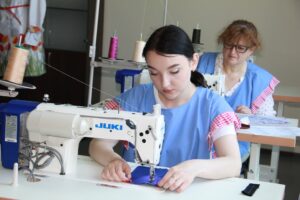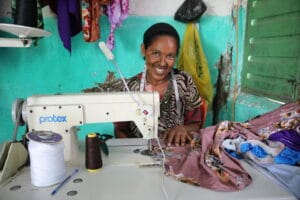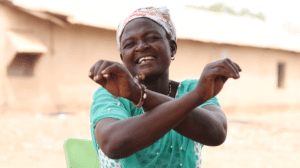The last two years have significantly impacted how we work, interact, and travel, and we are still learning to cope with the changes. If we look at the data, women, in particular, faced unequal effects of the pandemic from job, income, family responsibilities to health etc., thus leading to reversing the progress on gender equality made so far. A recent World Bank report puts nearly 2.4 billion women globally with unequal economic rights as men. In 2021 parenthood, pay, and workplace indicators did see some improvement, but there is much work to be done.
This year’s theme for International Women’s Day 2022 is Gender Equality for Sustainable Tomorrow. The aim is to celebrate women’s achievements, raise awareness and take action.
CDF Canada has been working with cooperative communities for over 75 years, and gender equality has been the core of our strategic framework. Over the years, we have seen that engaging women and men in cooperatives make communities more robust and resilient over the years.
Read the stories from the project offices that celebrate women’s progress and how men within the community share and stand with their partners. #BreakTheBias.
Ukraine: We Fall and Rise Again
 CDF Canada SEW Ukraine project aims to foster economic prosperity for 2,200 vulnerable women, including Internally Displaced Person (IDPs) living in the Kyiv, Kharkiv, and Dnipropetrovsk oblasts of Ukraine. The project is supporting women beneficiaries by giving access to employment, vocational training, workplace integration training, and ancillary services such as shared childcare facilities.
CDF Canada SEW Ukraine project aims to foster economic prosperity for 2,200 vulnerable women, including Internally Displaced Person (IDPs) living in the Kyiv, Kharkiv, and Dnipropetrovsk oblasts of Ukraine. The project is supporting women beneficiaries by giving access to employment, vocational training, workplace integration training, and ancillary services such as shared childcare facilities.
On the occasion of International Women’s Day, read some of the stories from the women participating in the program. The picture was taken late last year during the training sessions.
The story is written and sent by CDF Canada staff Vira Porovska just before the war. CDF Canada is fundraising for the #Ukraine. Donate Today.
#BreakTheBias: Working Together at Home and at Work

Nigatua fikadu, Ethiopia. pic Zerihun Kelbecha
“As a Gender Model Family, my husband and I took training on gender issues; this enabled us to be change agents in the gender transformation in our community. Breaking the social taboo in the community, my husband helps at home and in the trading business. The positive masculinity training has changed his old attitude towards gender and especially men’s role, thus reducing women’s burden. Our children have also known their role in the family and try to perform accordingly,” says Nigatuwa.
Read the story of change from Ethiopia, where communities are benefitting from the ongoing program.
I learn, I share and I stand: Tiwanban Nabilin

Tiwanban Nabilin, Ghana. Pic: Mac-Beth
Ibrahim TiJu said, “I’m the chief of this community and earlier when the meeting was called the women were not interested to come and if they did come, they were quiet. But since the 4R project came to the community, the women in the community are expressing their views in the meetings and are the first to be present at meetings.
I promise to use my power to encourage women and break every bias seen in this community. We cannot keep on making them feel less and rejected as if they are not part of the society.”
Read and learn how men in the Ghana communities are understanding the role of women.